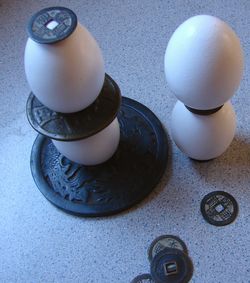LIÚ Cāo 刘操 = a presented scholar, nicknamed Hǎichán (海蟾Seatoad)
Hǎichán 海蟾 = His pet seatoad (also nicknamed Seatoad)
ZHŌNGLÍ Quán 种离权 = a Daoist immortal
LǙ Dòngbīn 吕洞宾 = another one
When the great Táng 唐 dynasty (period 12) fell in the year 907 after three centuries ruling China, the Liáo 辽 dynasty (period 16) was established across northern China, where it was to reign for two centuries. Like any proper dynasty, it immediately founded an imperial examination system, with a top title of “presented scholar” (jìnshì 进士) for exam-passers worthy of being presented to the new emperor. One of the earliest and most brilliant of all the new presented scholars was a young man named LIÚ Cāo 刘操. Liú Cāo topped everyone in intelligence and insight and especially in writing exam essays. As it happened, he was also handsome and charming, although he had a disturbingly excessive fondness for his pet sea toad. His fellow-students therefore called him Liú Hǎichán 刘海蟾, which meant “Seatoad Liú,” which wasn’t very nice of them.
The name Hǎichán stuck. Subsequent admirers pretended it should really be Hǎixiàng 海像, “Nautical Image” (which unfortunately sounds just like “walrus” 海象), or Hǎixiān 海仙 “the Sea Immortal” (which is sadly homonymous with “seafood” 海鲜), or Hǎishuāng 海双 “Sea twins” (which is silly). And some people maintain that his real name was simply Hǎi 海, and the “toad” part was never part of it. But in fact, once you are named Seatoad, you tend to keep the name, and so Liú Hǎichán has been called Liú Hǎichán for over a thousand years.
Another of the many successor kingdoms contending for power was the Later Liáng 后梁 Dynasty (period 13b), which started at the same time as the Liáo, but lasted only sixteen troubled years. However, even ill-starred projects can have promising beginnings, and it is said that Liú Cāo accepted the post of prime minister in the new Later Liáng state. (Other people say that, in hindsight, we can see that nobody would accept a post on what was destined to be the losing side, and that therefore Liú Cāo must have been a high minister in the winning Liáo régime. He was supposed to be smart, after all.)
Being the minister of a small and troubled state was enough to drive anyone to think about escaping it and devoting himself to the worship of the Yellow Emperor or the study of Daoism or even the keeping of sheep. Of course, young Liú definitely had such inclinations. One day, as he sat staring at his pet toad and thinking about the Dào or about the Yellow Emperor or perhaps about sheep, he received a visit from a disheveled man who seemed to materialize out of nowhere, whose pot belly protruded indecorously from his badly fitting robe, and who walked up to his table and imperiously demanded ten coins and ten eggs.
Liú Hǎichán immediately recognized the immortal ZHŌNGLÍ Quán 种离权, described elsewhere on this web site, so he provided the eggs and the coins, and watched in fascination as Zhōnglí tried to make a tower by setting down a coin and nestling an egg into the hole in the center, then balancing a coin on top of the egg and balancing another egg onto the hole at the center of that coin, and so on. (The picture here shows the general idea. If you try this at home, you may wish to boil the eggs first.)

The tower was not very high before Liú cried out that Zhōnglí was going to break the eggs. “The eggs are in less danger than your own life,” responded Zhōnglí Quán, referring of course to the fact that the leader of the Later Liáng state was a tyrant and usurper with a fondness for separating courtiers from their heads.
In a flash of insight, Liú Hǎichán lost all interest in worldly gain and Zhōnglí Quán abruptly vanished.
The following day, Liú resigned and denounced the corrupt ruler, then quickly left his post and, carrying a string of coins and his pet three-legged toad, he hurried out of town. He headed to Mount Zhōngnán 终南山 in Shānxī 山西 province, where he lived under the name Xuányīng 玄英 (“Hidden Hero”). There he escaped the pursuit of Later Liáng soldiers (who were looking for somebody named Liú Cāo, or perhaps Seatoad, but not Hidden Hero). Legend recounts that in this place he also soon encountered the famous immortal LǙ Dòngbīn 吕洞宾, who became his Daoist master and beloved friend and who taught him how to use gold to make the elixir of immortality.
Today one sees representations of the immortal Liú Hǎichán with his string of his coins and his toad (or hunting for his toad or sometimes even riding on his toad). Usually he also carries a gourd full of his elixir. Liú Hǎichán is always shown carrying money, even though he didn’t care about money. (Some people say that the money was a body product of the three-legged toad. Some also say they were the coins that led to his enlightenment.)
Many people pray to Liú Hǎichán for wealth (assuring him that they don’t care about it), and wealthy people display pictures and sculptures of him to show they are not materialistic and that constantly available money just happens to be their lot in life. Some people ignore Liú Hǎichán and venerate sculptures of the money-bringing toad all by itself, which of course brings no good result. Mean spirited people sometimes chop a leg off a captive toad in hopes that it will produce cash, but it never seems to.
A proverb even says of him: “As Liú Hǎi played with the gold-bearing toad, he gradually fished up real money.” (Liú Hǎi xì jīnchán, bùbù diào jīnqián. 刘海戏金蟾,步步钓金钱。) Unfortunately, it has never been clear what lesson the proverb teaches.